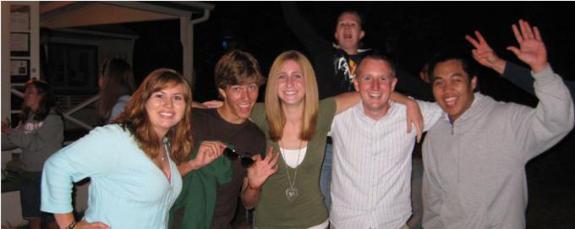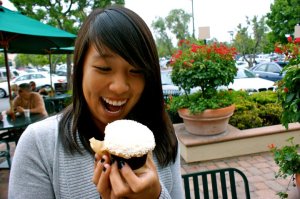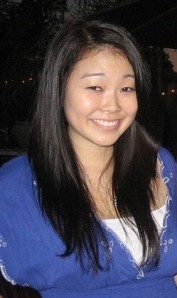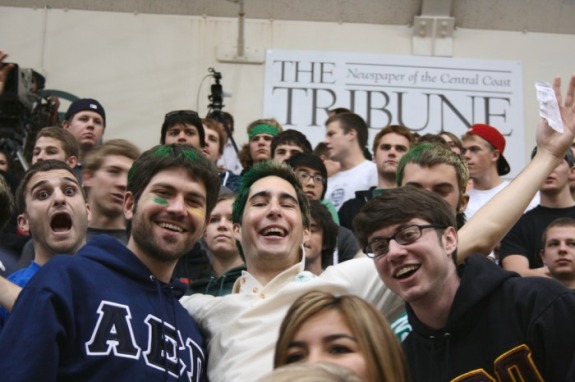December 7, 2010
Cal Poly’s Newman Catholic Center
In this post…
-What is Catholicism, exactly?
-What is the Newman Catholic Center?
-What do Cal Poly students have to say about the Newman Catholic Club?
Catholicism

Many Catholic churches resemble Saint Mary's Roman Catholic cathedral in Newcastle. Photo Courtesy: freefoto.com
According to answers.com, Catholicism refers to “the Christian church characterized by an episcopal hierarchy with the pope as its head and belief in seven sacraments and the authority of tradition.” It’s distinguished from other forms of Christianity by its focus on tradition, the sacraments, the mediation between God, communion, and the See of Rome (the jurisdiction of the Roman Catholic church).
There are seven sacraments (“a rite in which God is uniquely active”) that are administered by Catholic tradition:
1. Baptism– the basis for all other sacraments, the forgiveness of sins
2. Confirmation– gift of Holy Spirit bestowed in baptism is “strengthened and deepened,” postponed until when person is considered mature in faith
3. Eucharist– receiving of bread and wine that is believed to be Christ’s blood and body transformed by the mystical action of the Holy Spirit.
4. Penance (confession)- a sacrament of healing. It is a confession of sins to a minister with the power to absolve the individual.
5. Anointing of the Stick (unction)- the second sacrament of healing, where an individual who is suffering from an illness is anointed by a priest.
6. The Sacrament of Holy Orders-integrates an individual into the Holy Orders (bishops, priests, and deacons) in order to give him or her the mission to teach, sanctify, and govern in the faith.
7. Marriage– Holy Matrimony
Shannon Diaz, environmental management and protection senior and president of the Newman Catholic Club here at Cal Poly, briefed me on Catholic faith in her own words:
“We believe in the Trinity- the Father, Son, and Holy Spirit. We also believe in saints. We don’t worship saints, which is a misconception, but we pray to them and ask them for their support, as opposed to only praying to God or Jesus.”
The Newman Catholic Center on campus is located behind the health center. Here, students attend mass Monday through Thursday and spend their free time hanging out with fellow club members. Diaz, who was born and raised a Catholic, says she wasn’t very involved in church until spring quarter of her freshman year at Cal Poly. “It’s more enriching being with more college students and kids your age, as opposed to growing up with parents making you go to church and making you get involved,” she says.
What are students’ favorite things about the Newman center?
“The community here is unique in that it’s very open and friendly. It’s like a home away from home. You can relax and come hang out with friends.
–Katie Giles, architectural engineer junior
“I’d say it’s the relationships. The people I’ve met here are, without a doubt, the best people I’ve ever met. It’s incredible to have just a few friends that are really good, strong people, but everybody here is like that.”
–Jeff Traughber, philosophy junior
As part of the Newman Catholic club, what do students hope to accomplish at Cal Poly?
“One of the main things that I hope to accomplish is just to grow spiritually, mature in my faith, and become a better person in that. It’s also in a way preparing myself for what’s going to be happening after college, and make sure I’m going to be ready for all the trials I know I’m going to be facing in the real world.”
-Traughber
The Newman Catholic Center includes a separate women’s group and men’s group, where students can grow closer to their peers. Members participate in activities such as Bible study, weekly ultimate Frisbee games, feeding the homeless (community outreach), and daily Mass. There are different townhouses around San Luis Obispo near campus where Newman members reside.
Daily mass is every Monday through Thursday 11:10 a.m. to 11:40 p.m in the Newman Catholic Center chapel. “It’s a nice, calm spot in your day where you can receive the Eucharist and kind of center your day in prayer,” explains Giles.
Alpha Gamma Omega, a Christ-Centered Fraternity
Check out my interview with four brothers of AGO! You can use the pause button for your convenience.
Visit AGO’s website here to learn more.
EPIC Girls’ Bible Study: Continued
Remember my photo slideshow featuring Cal Poly’s EPIC (Every Person In Christ) girls’ bible study? (If not, scroll down to the post called “Girls’ Bible Study- Time to Wind Down”). This week, I did a quick interview with each of the five girls in the bible study group, who are also my own close friends, to get on a more personal level for this post. I joined them for casual day out to eat and explore together rather than their Monday night get-together. Check out what they had to say!
Joyce Yoo, graphic communications senior
1. Favorite thing about Bible study? Getting to catch up with everyone and their lives, and be a little family.
2. Describe this Bible study in one word? Loving.
3. Favorite food you’ve had at Bible study? “I liked it all. Especially the chocolate cake.”
4. Favorite thing to do outside of school? Get out of SLO. “Well, sometimes it’s nice in SLO. But I like to explore.”
5. What made you join this particular Bible study? “Initially I was in [Campus Crusade for Christ] Bible study, but I got closer to EPIC girls, so I decided to join this one instead.”
Dina Kim, liberal studies sophomore
1. Favorite thing about Bible study? “It’s time away from my busy daily college life- where I can relax and reflect and have time with God.
2. Describe your Bible study in one word? Comfort.
3. Favorite thing to do outside of school? Blogging, writing, singing.
4. Favorite food you’ve had at Bible study? “This is hard…everything! But I’m currently craving [Megan Ting]’s spinach dish.”
5. What made you join this particular Bible study? “To keep myself in check with the Lord and my beliefs.”
Megan Ting, nutrition senior
1. Favorite thing about Bible study? Being able to see everyone, catching up, and sharing what’s going on.
2. Describe your Bible study in one word? Trusting.
3. Favorite thing to do outside of school? Cooking, baking.
4. Favorite food you’ve had at Bible study? Banana strawberry chocolate pie that EPIC boys’ Bible study made today.
5. What made you join this particular Bible study? I love having personal time with God and the girls.
Ashley Chang, nutrition sophomore
1. Favorite thing about Bible study? “Having the environment where you can be there for each other and encourage each other.”
2. Describe Bible study in one word? Captivating. “It’s the name of the book we’re reading together, and it really relates to the overall feel of our get-togethers.”
3. Favorite thing to do outside of school? Eating yogurt at Yogurt Creations.
4. Favorite food you’ve had at Bible study? Yogurt.
5. What made you join this particular Bible study? “My close friends and I all decided to join together.”
Jennifer Woo, graphic communications sophomore
1. Favorite thing about Bible study? Relaxing, eating, catching up with girlfriends.
2. Describe your Bible study in one word? Fun.
3. Favorite thing to do outside of school? Hanging out with friends, going to the beach.
4. Favorite food you’ve had at Bible study? “Dinonuggets and chips.”
5. What made you join this particular Bible study? “I love the girls in it!”
Interested in learning more about on-campus Bible studies? Check out Campus Crusade’s site here.
Quiet Time at Cal Poly
If you don’t pay attention, you might just miss these quaint little spots around the Cal Poly campus. They offer a peaceful and relaxing environment to get in touch with your spirituality during a hectic school day. Click on the purple placemarks to check them out!
Uninspired? Check out some short and sweet articles on getting in touch with your spiritual side, like this one.
Interview with Abe Shabbar, MSA Secretary
Check out my audio interview with Abe Shabbar, an aerospace engineer senior of the Cal Poly Muslim Student Association!
A Glimpse of the Hindu Culture at Cal Poly
Viren Patel, an aerospace engineer third year, is the treasurer of ISA and an active participant in the Hindu faith. Check out what he had to say.
Q: Can you give me a little background on the Hindu religion?
A: The basic concept is that…we have people thinking that we’re polytheistic, that we have multiple gods, but I was brought up knowing that we had these multiple gods but in the end they are all different forms of the same god. So I wouldn’t say we’re polytheistic, just a little bit monotheistic. Our book is the Bhagavad Ghita, and then we also have other scriptures that are based off of that.
Q: What kinds of rituals or traditions do you follow?
A: Originally, back in the day, there were some main tenants that Hinduism put forth. With modernization, some of them have just been…people decide to follow them differently. As part of my religion, I don’t drink or smoke, eat meat. Just things like that, and then we also celebrate various holidays, like the fall season is more like the holiday season for Hindus because there’s so many holidays going on. One just passed, it’s called Navrati, and that’s a 9-day festival that celebrates the goddesses. There’s also other holidays like a Hindu brothers and sisters day. We also have Diwali, which is the festival of lights. That’s probably the biggest one. People in India actually get school and work off to celebrate Diwali.
Q: Is it normal for Hindus to not eat meat?
A: In India, it’s a lot more common. Even in India, there are Hindus who do eat meat, or who only eat chicken but not beef. I’ve met various Hindus that follow it to their own degree. I follow it to the degree that I don’t eat meat at all, but I have friends who only eat chicken or others who just won’t eat beef. I’ve been vegetarian ever since I was born.
Q: How do you think your family life and parents have affected your beliefs? Are they very religious?
A: I would say yes, because part of the culture…one of the things that’s very important to me is my family and my parents. I really value [my parents’] opinion and what they think, and it’s instilled in a lot of Hindu beliefs that you respect your parents and really valuing the importance of family.
Q: How do you think being Hindu has affected your college experience?
A: When I first came to Cal Poly, I wasn’t entirely sure if there were gonna be other people like me here. But fortunately I was able to find a group of friends through Cal Poly’s Indian Student Association, the ISA. There are other people like me- there are Hindus, vegetarians…and it was easy for me to fit in because through ISA’s events we were able to practice Hindu rituals and celebrate Hindu holidays. It made me feel more at home because at home there were a lot more Hindus in our community. Here, I thought it was going to be a lot more difficult. Being part of the college experience I just feel like it sets me apart from other people too, so it’s one of the things that defines who I am, so I’m proud of it, even though there aren’t as many Hindus here at Cal Poly.
Q: Is your religion a big enough part of your life that you find yourself talking about it a lot, even to people who are not Hindu?
A: Usually I try not to impose my religion on other people. I do my best not to, but if it comes up in conversation, like if somebody asks me why I’m vegetarian, or why I do something a certain way, I explain. If they have questions about it, I’m more than happy to explain it, because during my time here at Cal Poly, I’ve realized that not many people know too much about Hinduism, so I feel like if they don’t know and they want to know, I feel like I should be able to explain what Hinduism is about.
Q: How do you feel about the lack of diversity at Cal Poly? Is it something that bothers you?
A: I think it could be improved, just so we can educate the community about the different and diverse cultures. I come from Stockton, and that’s a really diverse area, and there’s just various cultures and people of different races and religions, and I enjoyed that because growing up in school, there was no majority; everybody was a minority. I enjoyed that because I could learn so many different things about different people, and growing up I thought the rest of the nation was like that. So when I came to Cal Poly it was somewhat of a culture shock.
Q: Would you say it was a bad thing for you?
A: It took a little while to adjust to it, but then I got used to it, and I’m fine with it. But I still do my best to try to increase diversity here, because I’m also part of PolyCultural. I was a hostee myself. Over the past two years, I’ve been on PolyCultural board trying to help out and bring in a diverse group of students to make the culture here at Cal Poly that much richer.
Q: What do you guys do to recruit new members for ISA?
A: PolyCultural is one of the main recruiting events, and then we also have other events where we can meet people. Whenever we meet people we invite them and they know other people and bring them along. Somehow it’s able to spread out through networking.
Q: Is ISA a big group?
A: I would say yeah. There are around 30 to 40 of us. We just get together at ISA events to have fun on a semi-regular basis. I would say it’s not as big as other schools, but it’s fairly large.
Q: Did you guys grow a lot this year?
A: Yeah, we had a decent influx of freshmen. It feels good to know there’s this whole new group that wants to be a part of this.
Cal Poly’s Muslim Student Association
- Islam is a religion that believes in peace, tolerance, patience, and respect.
- Cal Poly’s Muslim Student Association has more than doubled in size this year.
- In a college with much less diversity than other schools in California, there are pros and cons to being such a small religious group.
This week, I interviewed Zahra Hudda, Cal Poly senior and treasurer of Cal Poly’s Muslim Student Association to learn more about the Islam religion, and what their club is all about.
Q: Can you give a little background on what the Islam religion is all about?
A: I am from a sect of Islam called the Shia Imami Ismaili sect. We are different in that we follow only one Imam, as opposed to having an Imam per mosque, which is common in the Sunni faith. So we follow one Imam who is actually a direct descendant of the prophet Muhammad, and we can literally trace back his genealogy…Personally, myself and my family, we’ve all been raised to believe in peace, tolerance, patience. We’ve been taught to respect others and our faith. And I really can’t say more because essentially, the way I see it, a lot of our beliefs mirror common and standard moral ethics that are ingrained in most people regardless of religion.
Q: In what ways do you think being Muslim affects your college experience?
A: It’s unique. Let’s look at Cal Poly. If you look at Cal Poly and compare it with any of the other UC’s…All the UC’s have a lot of Muslims…For my sect of Islam, one of the reasons why Cal Poly is not actively sought out by its stellar record as an engineering college, or as a college in general, is because most people view a lack of Tema, which where we go for prayers, is a deterrent. As a whole though, if you look at communities in any of the UC’s and compare it with the MSA here, our MSA is miniscule. As such, it’s unique in that you run into a lot of other faiths. Essentially it’s broadening your perspectives.
Q: What kind of benefits do you see, and what kind of disadvantages, in the fact that you guys are so small here at Cal Poly, where the diversity is pretty low?
A: I’d say the fact that we bring some diversity to Cal Poly is a benefit. [Being small] allows us to get to know each other well; it allows us to create strong ties. At the same time, some people do view it as a deterrent because there’s not that big of a pool, if you know what I mean.
Q: Because you guys are so small, do you guys focus on spreading awareness of your guys’ religion, or are you guys more focused on bonding with whoever in MSA?
A: Up until this year, our MSA consisted of like three to four people who actually show up. So this is the first year we’ve actually got a good number of people. So that alone provides complications because in the past, we’ve talked a lot about exposure, but due to the small number of people, and the fact that even though we’re all friends, we have our own lives, it was just really hard and it didn’t really happen to get people together and actually raise awareness. Now it’s something we’re actively looking into; however, it’s the beginning of the school year so we’ve only had about three meetings.
Q: Do you feel like the discrimination against the Islam religion with all the conflicts with Iraq and Afghanistan is relevant to Cal Poly? Have you ever experienced being discriminated against?
A: It depends. Although I’m religious, I don’t talk about religion that much. Most people associate Islam with Pakistan, Iraq, Iran, Afghanistan. I’m actually from India, and most if not all my friends are aware of that. So up until I actually say I’m Muslim they all assume I’m either Hindu or Christian, and even then, when they found out im muslim, most people respond with disbelief that I’m a Muslim from India, and so the question of my ethics or beliefs never come up. Because usually by then they know me well enough to know that I’m a decent person, to know my ethics and my morals, and they know I’m a person they can call regardless of the situation.
Q: What are your thoughts on the situation in Hamburg, Germany, where they’re working on making Islam an official religion?
A: I think that shows just a remarkable openmindedness given the world as a whole with regards to the faith. I view it as a recognition that Islam is being seen from the point of view of a majority that the media ignores. Because if you look at the media, they’re focused on what terrorists have done, and they don’t really look at the fact that the terrorists are a minority in comparison to the number of Muslims in the world.
Q: On another note more relevant to this school, what kinds of activities do you do with MSA that pertains to your religion?
A: That varies. I’m Shia so I don’t go to the mosque. I found out about a year or so ago that when we started going to the Jamat Khana, people stopped to the mosque. So I actually don’t go to the mosque. I know that the guys go regularly on Fridays. Like I said, this is the first year that we’ve had a substantial amount of people and so this past weekend, we had a bonfire. I think everybody was there…what they did for that was they played games, did icebreakers, and it was essentially a bonding activity to bring the Cal Poly Muslim community closer.
Q: How much have you guys grown this year?
A: We’ve either doubled or tripled.
Do you know the difference…
…between Mormonism and Christianity? What teachings does Mormonism have that differ from those of Christianity? Take a look at this Q&A to find out.
Q: What is the main belief that separates Mormon belief from a Christian’s?
A: The main difference is that Mormons believe that the Mormon church is the restored church of Jesus Christ, meaning that it is the same church that Christ set up when he was on the earth. They believe their church is headed by a prophet and 12 apostles, just like those who existed in the primitive church.
Q: How do Mormons view God, exactly?
A: Mormons believe that God is literally the spirit Father in Heaven, and that God once led a life much like that of Jesus Christ, while Christianity teaches that God is a spirit without flesh or bones that has never lived in human form. Mormonism teaches that the purpose of life is to become more like God (which is why we received bodies), and that someday they will be the heirs of God’s glory.
“God himself was once as we are now, and is an exalted man, and sits enthroned in yonder heavens!!! . . . We have imagined that God was God from all eternity. I will refute that idea and take away the veil, so that you may see.”
-Teachings of the Prophet Joseph Smith, p.345
“The Father has a body of flesh and bones as tangible as man’s.”
-Doctrine and Covenants 130:22
Q: What is the official doctrine of Mormonism?
A: The Book of Mormon. Mormons also consider the Bible, Doctrine and Covenants, and Pearl of Great Price sacred texts. Meanwhile, the Bible is the only official sacred text of Christianity.
“The Book of Mormon is the word of God, like the Bible. It is holy scripture, with form and content similar to that of the Bible. Both books contain God’s guidance as revealed to prophets as well as religious accounts of different civilizations. While the Bible is written by and about the people in the land surrounding Israel, and takes place from the creation of the world until shortly after the death of Jesus Christ, the Book of Mormon contains the history and God’s revelations to the people who lived in the Americas between approximately 600 BC and 400 AD. The prophets in the Book of Mormon recorded God’s dealings with His people, which were compiled by a man named Mormon onto golden plates.
-www.mormon.org
Q: Does this mean that Mormons don’t believe in the Bible?
A. No. The Book of Mormon and the Bible support each other.
“The Book of Mormon is not a replacement for the Bible. In fact, because the Book of Mormon and the Bible both contain the gospel of Jesus Christ as it was revealed to different civilizations, studying them together can clarify some concepts that are difficult to understand. The Book of Mormon tells us to read the Bible and affirms that its message is true (Mormon 7:8-10)…The Book of Mormon makes it clear that Jesus Christ’s message and His atonement are not for one group of people at one time. They are for everyone, everywhere, from the beginning of the earth to the end. Having the Book of Mormon as another testament of Jesus Christ reminds us that He is mindful of every one of us.”
-www.mormon.org
Q: Do Mormons believe in evolution?
A: Mormons believe that God created the earth. The church has no official position on evolution, but many in the church believe that God may have used the process of evolution to create all life. Mainstream Christianity rejects the idea of science being involved in the creation of the universe.
Q: What are the Mormon beliefs on afterlife?
A: It’s believed that all spirits go to the “spirit world,” undergo preparation, then join with those in the resurrection. The “good” go to “spirit paradise” during the intervening time, and the “wicked” go to “spirit prison.” Mormons believe in a second chance after death during a period of “learning and preparation.” Meanwhile, Christians do not believe in a second chance after death. They believe that “souls of wicked” are sent to hell, and that believers go to heaven for eternity.

The Mormon temple is a main focus of the Mormon faith, where ceremonies and ordinances are held. Photo Credit: mormonfamily.net
See a comparison chart of Mormonism versus mainstream Christianity here.
Alpha Epsilon Pi- Cal Poly’s Jewish Fraternity
When I first saw Alpha Epsilon Pi on ASI’s religious club list, that label made me assume it was very different from all the mainstream fraternities. True or false? After interviewing a handful of the brothers of AEPi, the answer is: both. They know how to have a good time, like any other fraternity, AND they keep a kosher kitchen.
“Our fraternity was social before religious. It’s basically like any other fraternity, like AGR, for example. They’re social but they have that one thing about them that makes it a stronger connection. So ours happens to be that we’re all Jewish.”
-Jeremy Lipton-Schwartz, Rush Chairman
“As part of the Jewish culture, we celebrate our successes and this helps us keep sight of who we are. I’m not saying that other fraternities at Cal Poly are, but we’re definitely not the common stereotype of a fraternity that gets drunk every weekend for no reason.”
-Andrew Max, President
“I’m sure you hear a lot of rumors about hazing, forced-drinking, and all kinds of bad stuff. But its important to know that despite the fact that we like having a good time- Alpha Epsilon Pi has a zero tolerance policy against hazing- we’re smart and responsible enough to know that forced-drinking is not the way to create a brotherhood. It’s not the way to make a life-long friend…That kind of irresponsibility is not what we’re all about. It’s contradictory with what our morals are.”
-Alex Leanse, New Member Educator
After talking to the guys for a while, I found out that they aren’t the super religious group of guys I thought they would be. In fact, their fraternity is more about the cultural side of Judaism rather than the religious side. One of the guys told me that before he joined this fraternity, he wasn’t involved in anything Jewish since his bar mitzvah. It’s just about having an interest in the culture and wanting to learn more about it; you don’t have to be Jewish in order to be a part of this brotherhood.
What is Judaism?
^click link
“On a cultural level, Judaism values family a great deal; we value our intimate and close relationships a lot. Judaism has taught me to remember all our hard times and all our struggles, but at the same time it has taught me that the success of the Jewish people, past and present, is just as important to have in the forefront of my mind.”
–Andrew Max, President
Judaism is a monotheistic faith. How individuals choose to understand or connect with God varies; in other words, each individual’s relationship with God is personal. Judaism teaches that all mankind was created “b’tzelem Elohim,” Hebrew for “in the image of God,” and that all Jews have a unique connection as a part of the global Jewish community.
Jewish tradition teaches that one day a Messiah will come and bring peace and unity to all humanity. The Torah is Judaism’s sacred text that includes stories and commandments that teach about life and death. The particulars of an individual Jew’s belief vary, but in a nutshell, Judaism is concerned with the well-being of humankind.
Although AEPi’s purpose is more social and cultural rather than religious, most members still try to keep close contact with their heritage. For example, at every meeting, the brothers read a passage from the Torah that relates to the present time. “It’s wisdom and teachings are not limited to ancient times,” Max says. “It can really apply to today.”
As a group of guys who share a similar upbringing in a Jewish family, many brothers were attracted to this fraternity because of that connection. Leanse, the new member educator of AEPi, came to Cal Poly and joined his second year from Cuesta. “I haven’t really been involved in the Jewish community,” Leanse said, “and it’s kind of nice to come back to that really. Having these guys I knew I could depend on and have a special connection with because we share the same faith…even though we’re not necessarily religious, it is still part of my culture so I think that sense of community and brotherhood attracted me to this fraternity.”
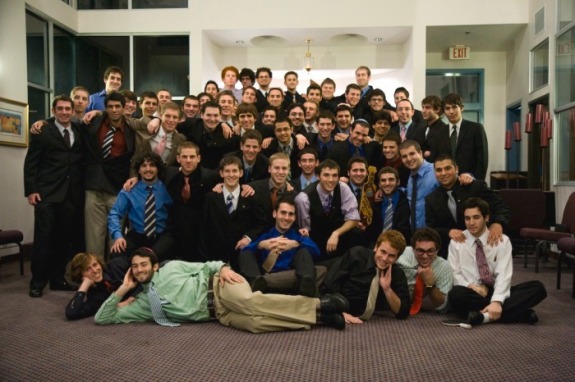
AEPi currently consists of 46 active members. They hope to add around eight new members this fall. Photo Credit: sloaepi.org
Learn more about AEPi as a national organization here.
